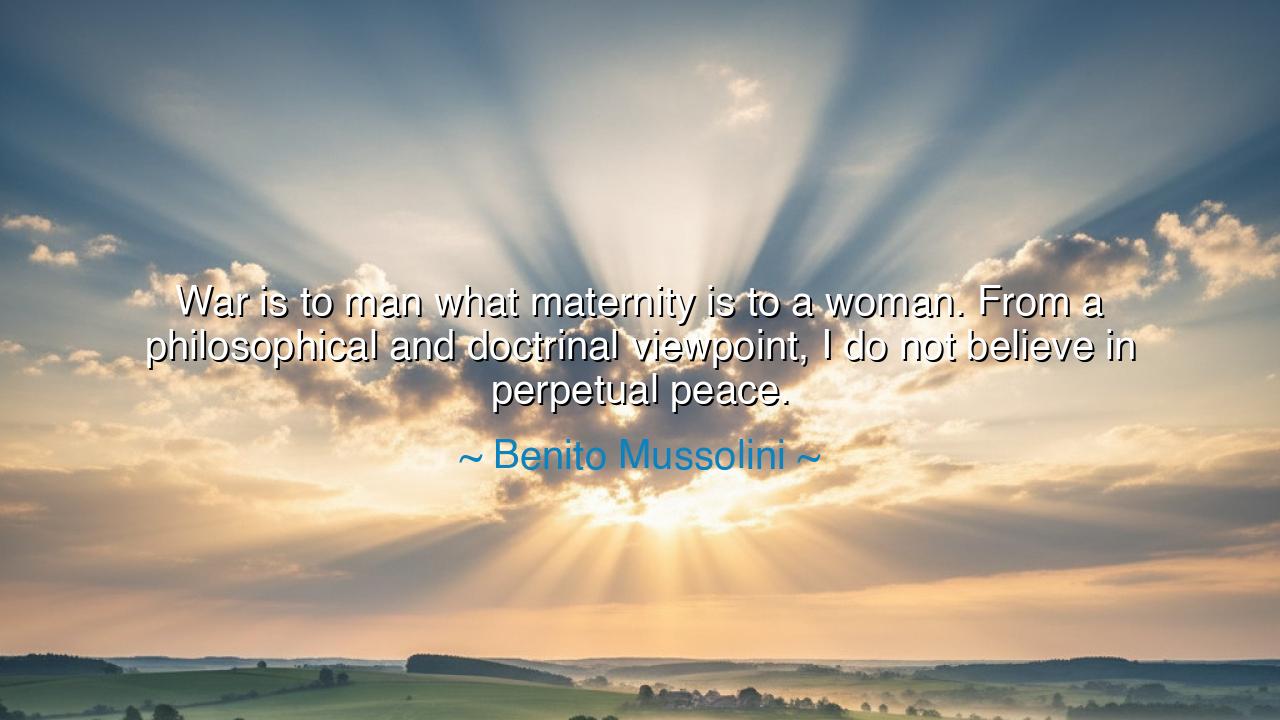
War is to man what maternity is to a woman. From a philosophical
War is to man what maternity is to a woman. From a philosophical and doctrinal viewpoint, I do not believe in perpetual peace.






"War is to man what maternity is to a woman. From a philosophical and doctrinal viewpoint, I do not believe in perpetual peace." Thus spoke Benito Mussolini, the voice of a man intoxicated by the dream of power and conquest. His words, heavy with certainty, attempt to bind war to the very nature of man, as if bloodshed were destiny and violence the truest expression of strength. In this comparison he likens battle to maternity, a natural and inevitable act, and denies that mankind could ever dwell in eternal peace. His vision is not one of harmony, but of conflict as the furnace of life.
The ancients themselves wrestled with such thoughts. Heraclitus, the dark philosopher of Ephesus, declared that war is the father of all things, believing strife to be the source of creation and change. And indeed, history is filled with empires that rose through conquest: Rome, whose legions carved order from chaos; the Mongols, whose horses thundered across continents. To them, battle seemed the heartbeat of history, the tool by which nations were born and civilizations reshaped. Mussolini, drawing from this tradition, proclaimed that war is not an aberration, but the very condition of man.
Yet his words are also a warning, for history proves that such a vision devours itself. The Fascist creed exalted war as a virtue, but it was war that consumed Mussolini and his empire. His denial of perpetual peace led Italy into devastation, his people broken, his rule shattered, his own body dragged through the streets. Thus his philosophy, though ancient in tone, proved fatal in practice. For while conflict may shape history, it is not the only force that sustains it—compassion, invention, justice, and cooperation also carry the weight of civilization.
Consider the contrast with leaders who sought peace. Ashoka the Great of India began as a conqueror, his hands drenched in blood. Yet after the horrors of Kalinga, he renounced further wars and chose to rule through compassion, spreading Buddhism across Asia. His empire endured not through constant fighting, but through the bonds of morality and unity. Where Mussolini denied perpetual peace, Ashoka sought it and in doing so left a legacy brighter than the ashes of conquest.
Children of tomorrow, mark this well: there will always be voices who tell you that war is natural, that violence is destiny, that peace is a dream for the weak. These voices are dangerous, for they cloak destruction in the garb of necessity. War may come, yes—but it need not be worshiped. To glorify it is to blind oneself to its ruin. To embrace it as inevitable is to abandon the higher call of mankind: to build, to preserve, to uplift.
Practical wisdom lies here. Do not be seduced by those who exalt violence as proof of strength. True strength lies not in how well a man destroys, but in how well he creates, how firmly he protects, how deeply he loves. When conflict arises, face it with courage, but never forget that it is the last resort, not the measure of your manhood. Seek instead to labor for peace, to resolve disputes with wisdom, and to teach others that the glory of life lies not in spilling blood, but in preserving it.
Thus the lesson is clear: Mussolini’s words are a reflection of an ancient belief, but also a warning of its danger. To equate war with the natural rhythms of life is to mistake destruction for creation. Peace may be fragile, but it is no illusion; it is the soil in which families grow, where art flourishes, where knowledge expands. Let us not believe that war is our destiny. Let us instead declare that the true destiny of man is not perpetual strife, but the patient and heroic labor of peace.






AAdministratorAdministrator
Welcome, honored guests. Please leave a comment, we will respond soon